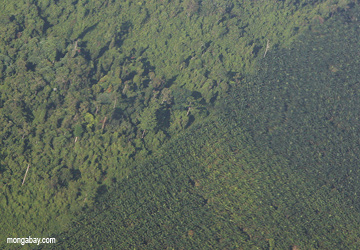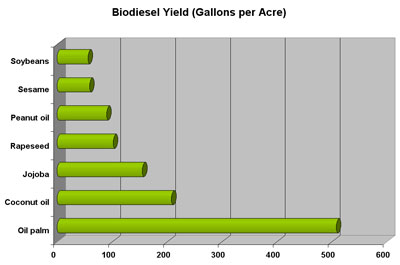KFC Corporation, the fast food giant, will stop using palm oil in its deep friers, reports The Independent.
KFC said it is making the change due to health and climate concerns. Palm oil is high is saturated fat and has been associated with destruction of carbon-dense peatlands and rainforests in Indonesia and Malaysia.
Beginning this month, KFC will “use high oleic rapeseed oil at its 800 outlets in UK and Ireland” according to The Independent. KFC estimates the change will reduce saturated fat in its chicken products by 25 percent.
 Oil palm plantation and logged-over forest in Borneo. |
“Switching to high oleic rapeseed oil means not only can we offer our customers the benefit of reduced saturated fats, but the assurance we’re doing everything we can to lessen our impact on the environment,” Mark Bristow, head of KFC food assurance told The Independent.
KFC will continue to use palm oil in fries, buns, and hash browns, but says it aims to convince its supplies to switch to other oil sources or use palm oil certified under the Roundtable on Sustainable Palm Oil (RSPO), a body that establishes social and environmental standards for palm oil production.
It was not immediately clear whether KFC’s change applied to KFC’s global operations.
The move comes after pressure from environmental groups, including Greenpeace, whose campaign against the company featured orangutans, endangered apes that inhabit forests being converted for palm oil.
 Noting its high yield, the palm oil industry maintains that its crop requires less land and costs less than other oilseeds and has improved living standards for millions of people. |
But the palm oil industry maintains the high productivity of its crop means that it needs less land to produce the same amount of oil had land been cultivated with other crops like rapeseed. Nevertheless, some environmentalists find fault with palm oil because expansion of oil palm plantations have taken a heavy toll on forests. Published research indicates that more than half of oil palm expansion has occurred at the expense of natural forests in Indonesia and Malaysia.
Related articles
Coalition calls on Europe to label palm oil on food products
(03/15/2011) Do you have the right to know whether the chocolate bar you’re munching on includes palm oil, which is blamed for vast deforestation in Malaysia and Indonesia? How about that frozen pizza? According to a coalition of environmental and conservation groups it’s time for food manufacturers to add palm oil to the label in Europe, instead of currently being listed as simply, and erroneously (palm kernels are fruits), ‘vegetable oil’.

(03/11/2011) McDonald’s announced a far-reaching sourcing policy that could significantly reduce the fast-food giant’s impact on the environment, including global forests. Yesterday McDonald’s unveiled its Sustainable Land Management Commitment, a policy that requires its suppliers to use ‘agricultural raw materials for the company’s food and packaging that originate from sustainably-managed land’.
Breakthrough? Controversial palm oil company signs rainforest pact

(02/09/2011) One of the world’s highest profile and most controversial palm oil companies, Golden Agri-Resources Limited (GAR), has signed an agreement committing it to protect tropical forests and peatlands in Indonesia. The deal—signed with The Forest Trust, an environmental group that works with companies to improve their supply chains—could have significant ramifications for how palm oil is produced in the country, which is the world’s largest producer of palm oil.
Consumers should help pay the bill for ‘greener’ palm oil
Greening the world with palm oil?

(01/26/2011) The commercial shows a typical office setting. A worker sits drearily at a desk, shredding papers and watching minutes tick by on the clock. When his break comes, he takes out a Nestle KitKat bar. As he tears into the package, the viewer, but not the office worker, notices something is amiss—what should be chocolate has been replaced by the dark hairy finger of an orangutan. With the jarring crunch of teeth breaking through bone, the worker bites into the “bar.” Drops of blood fall on the keyboard and run down his face. His officemates stare, horrified. The advertisement cuts to a solitary tree standing amid a deforested landscape. A chainsaw whines. The message: Palm oil—an ingredient in many Nestle products—is killing orangutans by destroying their habitat, the rainforests of Borneo and Sumatra.

(01/12/2010) Palm oil is one of the world’s most traded and versatile agricultural commodities. It can be used as edible vegetable oil, industrial lubricant, raw material in cosmetic and skincare products and feedstock for biofuel production. Growing global demand for palm oil and the ensuing cropland expansion has been blamed for a wide range of environmental ills, including tropical deforestation, peatland degradation, biodiversity loss and CO2 emissions. In response to these concerns, a group of stakeholders—including activists, investors, producers and retailers—formed the Roundtable on Sustainable Palm Oil (RSPO) to develop a certification scheme for palm oil produced through environmentally- and socially-responsible ways. It is widely anticipated that the creation of a premium market for RSPO-certified sustainable palm oil (CSPO) would incentivize palm oil producers to improve their management practices.